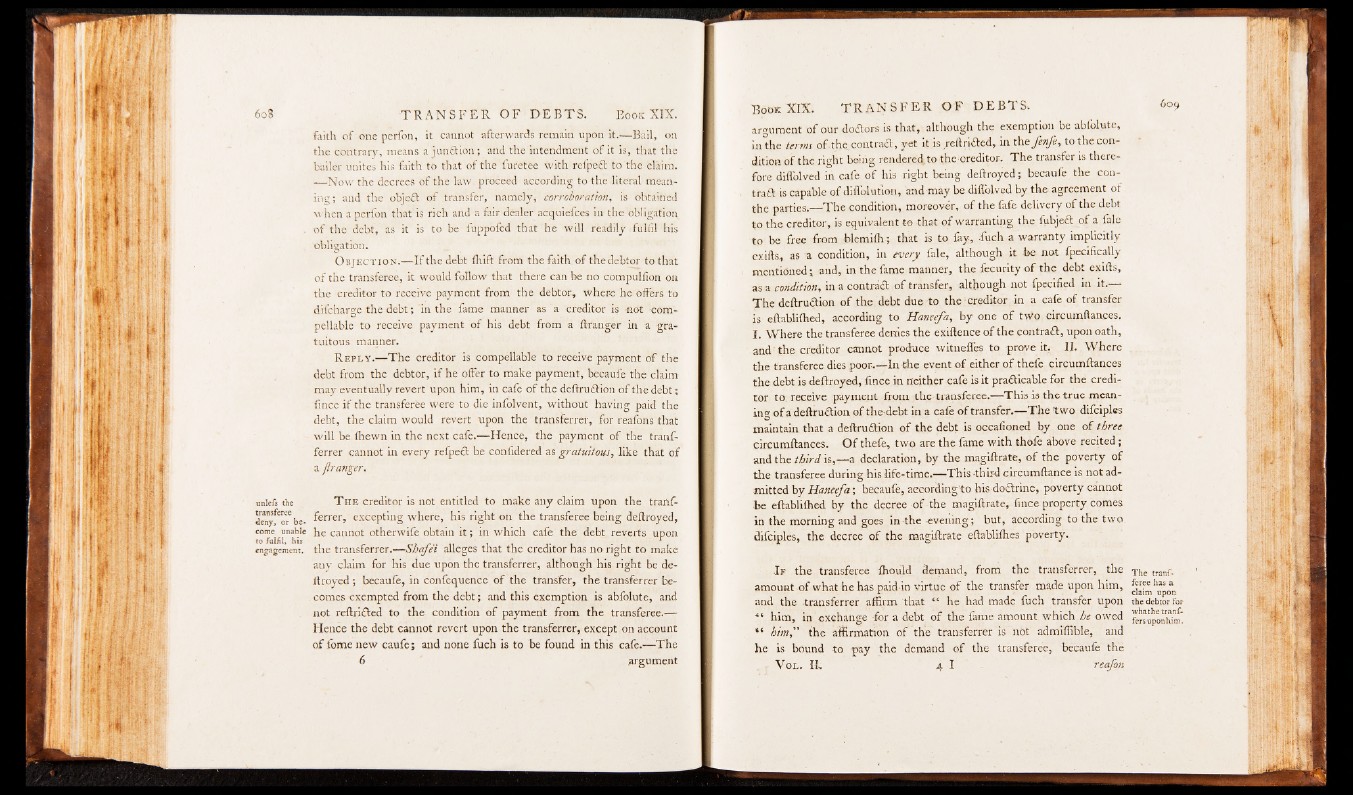
6o8 Eook XIX.
unlefs the
transferee
deny, or become
unable
to fulfil, h is
engagement.
T R A N S F E R O F D E B T S .
faith of one perfon, it cannot afterwards remain upon it.— Bail, on
the contrary, means a jundion ; and the intendment of it is, that the
bailer unites his faith to that of the furetee with refped to the claim.
— Now the decrees of the law. proceed according to the literal meaning
; and the object of transfer, namely, corroboration, is obtained
when a perfon that is rich and a fair dealer acquieices in the obligation
of the debt, as it is to be fuppofed that he will readily fulfil his
obligation.
Objection.— If the debt fliift from the faith of the debtor to that
of the transferee, it would follow that there can be no compulfion on
the creditor to receive payment from the debtor-, where he offers to
difeharge the debt ; in the fame manner as a creditor is -not compellable
to receive payment of his debt from a ftfanger in a gratuitous
manner.
R eply.— The creditor is compellable to receive payment of the
debt from the debtor, if he offer to make payment-, becaufe the claim
may eventually revert upon him, in cafe of the deftrudion of the debt ;
fince if the transferee were to die infolvent, without having paid the
debt, the claim would revert upon the transferrer, for reafons that
will be (hewn in the next cafe.— Hence, the payment of the tranf-
ferrer cannot in every refped be confidered as gratuitous, like that of
a fir anger.
T he creditor is not entitled to make any claim upon thetranf-
ferrer, excepting where, his right on the transferee being deftroyed,
he cannot otherwife obtain it ; in which cafe the debt reverts upon
the transferrer.— Shafe’i alleges that the creditor has no right to make
any claim for his due upon the transferrer, although his right be de-
Itroyed ; becaufe, in confequence of the transfer, the transferrer becomes
exempted from the debt ; and this exemption is abfolute, and
not reftrided to the condition of payment from the transferee.—
Hence the debt cannot revert upon the transferrer, except on account
of fome new caufe; and none fuch is to be found in this cafe.— The
6 argument
Book XIX. T R A N S F E R O F D E B T S . 609
argument of our doftors is that, although the exemption be abfolute,
in the terms of the contrail, yet it is reftrided, in the fenje, to the condition
of the right being rendered,to the creditor. The transfer is therefore
diffolved in cafe of his right being deftroyed; becaufe the con-
trad is capable of diflolution, and may be difl'olved by the agreement of
the parties.— The condition, moreover, of the fafe delivery of the debt
to the creditor, is equivalent to that of warranting the fubjed of a fale
to be free from blemilh ; that is to fay, -fuch a warranty implicitly
exifts, as a condition, in every fale, although it be not fpecifically
mentioned; and, in the fame manner, the fecurity of the debt exifts,
as a condition, in a contrad of transfer, although not fpecified in it.—
The deftrudion of the debt due to the creditor in a cafe of transfer
is eftablilhed, according to Hamefa, by one of two circumftances.
I. Where the transferee denies the exiftence of the contrad, upon oath,
and the creditor cannot produce vvitneffes to prove it, II. Where
the transferee dies poor.— In the event of either of thefe circumftances
the debt is deftroyed, fince in neither cafe is it pradicable for the creditor
to receive payment from the transferee.— This is the true meaning
of a deftrudion of the-debt in a cafe of transfer.— The tw o difciples
maintain that a deftrudion of the debt is occafioned by one of three
circumftances. O f thefe, two are the fame with thofe above recited;
and the third 's*,— a declaration, by the magistrate, of the poverty of
the transferee during his life-time.— This -third circumftance is not admitted
by Haneefa; becaufe, aeoordingto his dodrine, poverty cannot
be eftablilhed by the decree of the magiftrate, fince property comes
in the morning and goes in the -evening; but, according to the two
difciples, the decree of the naagiftrate eftablilhes poverty.
I f the transferee fhould demand, from the transferrer, the The tranf-
amount of what he has paid-in virtue of the transfer made upon him,
and the -transferrer affirm that “ he had made fuch transfer upon the debtor for
“ him, in exchange -for a debt of the fame amount which he owed
“ him,” the affirmation of the transferrer is ilôt admiffible, and
he is bound to pay the demand of the transferee, becaufe the
V o l . II. 4. I reafon